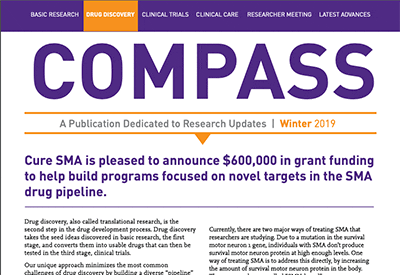Originally published on August 20, 2014.
Recently, we announced that Dr. Lyndsay Murray at The University of Edinburgh will receive a a Cure SMA basic research grant of $80,000 over two years, to explore the reasons causing motor neuron cell death in SMA.
Motor neurons are nerve cells in the brain stem and spinal cord that control muscle movement. We know that, in SMA, these cells cannot properly function and eventually die. By learning more about what happens to these cells and how they die, we may be able to develop more effective ways of making drugs to treat SMA.
Meet Dr. Murray
Who are you?
I am a newly appointed researcher and lecturer at the University of Edinburgh.
How did you first become involved with SMA research?
I started working on SMA research during my PhD in the laboratory of Dr. Gillingwater and have maintained this interest during my postdoctoral studies in the laboratory of Dr. Kothary. SMA research will now be a key focus for me as I start my own lab at the University of Edinburgh.
What is your current role in SMA research?
I currently work on the basic science aspects of SMA research. My main focus is looking at what makes motor neurons vulnerable in SMA and developing methods to protect them from death and dysfunction.
Tell us about your project, “Investigating The P53 Signaling Pathway in Pathogenesis of Mouse Models of SMA.”
Objective: In this study we aim to ask two main questions. Firstly, how early does motor neuron cell death occur? Secondly, we want to investigate whether delaying cell death while administering other therapies, can increase the beneficial effects.
Research Strategy: We will use mouse models of SMA to investigate when motor neurons actually start to die in SMA. We will also use transgenic mice to restore SMN protein at symptomatic phases while simultaneously inhibiting cell death.
Significance: This work has important implications both for understanding the basic process of disease in SMA and for developing a new therapeutic approach, which could help patients who are treated after their symptoms begin. It will also begin to assess combination therapeutic approaches for SMA.
Our Funding Strategy
Cure SMA is leading the way to a world without SMA by advancing a comprehensive research program. One of the key components of this strategy is basic research. We’ve awarded 79 basic grants for a total of over $9.5 million in the past 10 years.
Learn more about our basic research program, and about the other components of our research strategy: drug discovery, clinical trials, and clinical care.



